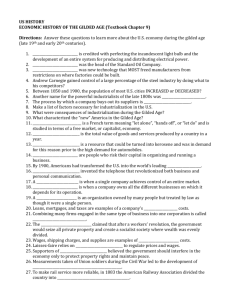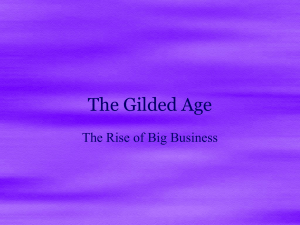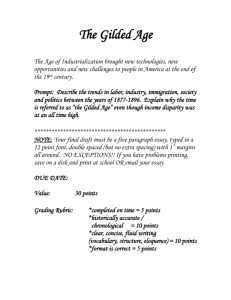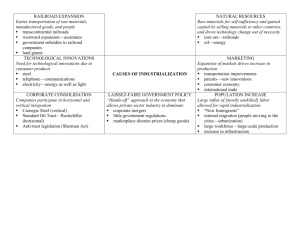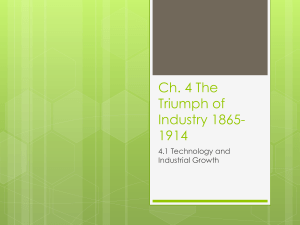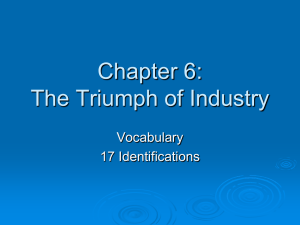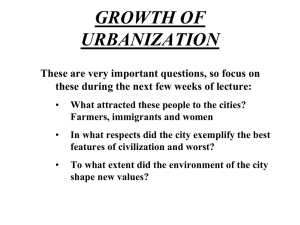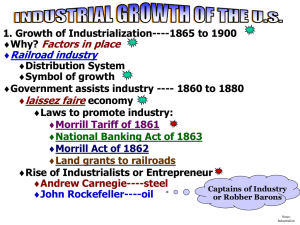The Gilded Age Notes
advertisement
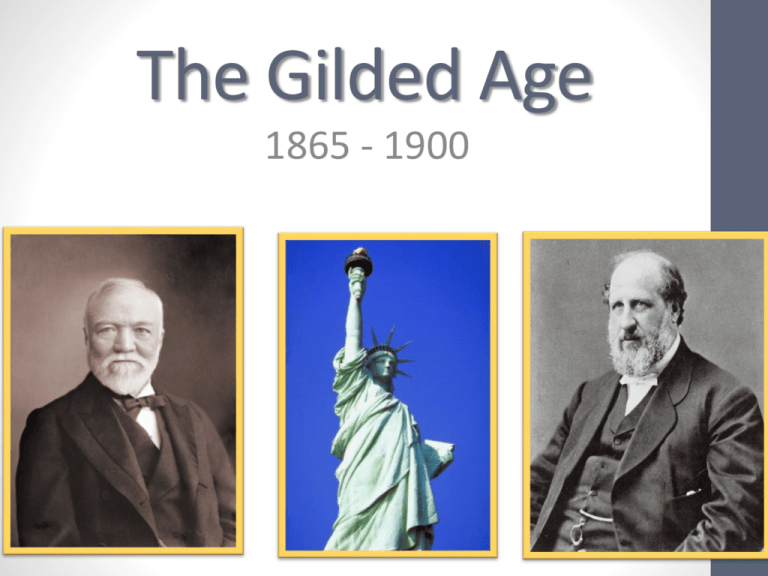
The Gilded Age 1865 - 1900 “Gilded Age” – 1870-1900 •Post-Reconstruction America •Phrase coined by Mark Twain; used to represent America during this time •Also, think of a beautiful, shiny, red apple… that is rotten on the inside • This was America during this time period (1870-1900) • On the outside, golden, shiny, beautiful: • Expanding economy, population growth • Extravagant displays of wealth by America’s upper class • Hiding the rotten inside: • Political corruption, scandals, greed, child labor, materialism, racial discrimination, etc. Industrialization Immigration Urbanization The Gilded Age Discrimination in the South & West Populism Political Corruption Life in the 1860s Life in the 1900s • No indoor electric lights No refrigeration • No indoor plumbing • Kerosene or wood to heat • Wood stoves to cook with Horse and buggy • In 1860, most mail from the East Coast took ten days to reach the Midwest and three • weeks to get to the West Coast. • • A letter from Europe to a person on the frontier could • take several months to reach its destination. • • • • • • • US Govt issued 500,000 patents—electricity Refrigerated railroad cars Sewer systems and sanitation Increased productivity made live easier and comfortable. Power stations, electricity for lamps, fans, printing presses, appliances, typewriters, etc. New York to San Francisco to 10 days using railroad. 1.5 million telephones in use all over the country Western Union Telegraph was sending thousands of messages daily throughout the country. •Natural Resources •Capital (gold, silver and banking) •US Government support •Desire: Creative inventors and industrialists •Transportation System •Labor force (immigrants) •Oil •Railroad •Mining •Marketing •Sugar •Sewing Machine •Steel •Vacuums •Meatpacking •Typewriters •Beef/Cattle •Automobile •Construction •Salt •Telegraph •Coal •Telephone •Agricultural •May 10, 1869 at Promontory, Utah •“The Wedding of the Rails” •Central Pacific and Union Pacific In 1856 Henry Bessemer devised a way of converting iron into steel on a large scale. His invention involved blowing air through molten iron in a converter, or furnace, in order to burn off the excess carbon. His invention revolutionized the Industrial Age. New Uses for Steel Steel used in railroads, barbed wire, farm machines Changes construction: Brooklyn Bridge; steel-framed skyscrapers With the Bessemer Process and Carnegie steel, Skyscrapers revolutionized the building industry….. Major city skylines would be dotted with this new type of building as the 1900’s begin. BETWEEN 1860 TO 1900 •Elevator---1852 •Bessemer Process---1852 •Sewing Machine---1853 •Dynamite---1867 Between 1800 to •Typewriter---1868 1900, US Govt. •Levi Blue Jeans/Basketball---1873 issued 500,000 •Telephone---1876 patents •Phonograph---1878 •Light bulb and cash register---1879 •Zipper---1883 •Gasoline automobile and skyscraper---1885 •New York City---first city to have electricity--1890 •Radio---1895 •Subway---1897 •X-ray---1900 Some other inventions created during Gilded Age • Cola-Cola (1886) • Streetcars (1888) • Record Player (1877) • Skyscraper (1885) • Airplane (1903) Thomas Alva Edison “Wizard of Menlo Park” “Wizard of Menlo Park” Edison Inventions helped to shape modern society •More than 1,000 inventions patented •Light bulb •Phonograph •Incandescent electric lamp •Starter for automobiles that eliminated hand crank •Batteries •Perfected stock ticker •New York City first city to powered by electricity •The motion picture camera and projector •First used “hello” as phone greeting •Helped Alexander G. Bell with the telephone The Airplane Wilbur Wright Orville Wright Kitty Hawk, NC – December 7, 1903 Model T Automobile Henry Ford I want to pay my workers so that they can afford my product! “Model T” Prices & Sales BETWEEN 1860 TO 1900 •Specialty stores----sold single line of goods •Department stores---combined specialty stores •Chain stores---stores with branches in cities •Mail catalog stores •New ways to advertise Montgomery Wards, J.C. Penney, Macy’s, Sears and Roebuck and Woolworths Causes of Rapid Industrialization 1. Steam Revolution of the 1830s-1850s. 2. The Railroad fueled the growing US economy: First big business in the US. A magnet for financial investment. The key to opening the West. Aided the development of other industries. Causes of Rapid Industrialization 3. Technological innovations. Bessemer and open hearth process Refrigerated cars Edison o “Wizard of Menlo Park” o light bulb, phonograph, motion pictures. Causes of Rapid Industrialization 4. Unskilled & semi-skilled labor in abundance. 5. Abundant capital. 6. New, talented group of businessmen [entrepreneurs] and advisors. 7. Market growing as US population increased. 8. Government willing to help at all levels to stimulate economic growth (government intervened). 9. Abundant natural resources.
